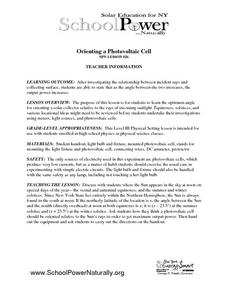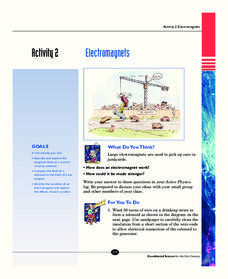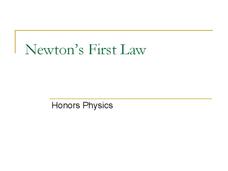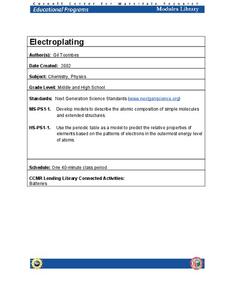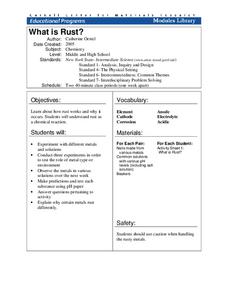Mr. E. Science
The Nature of Electromagnetic Waves
Imagine a presentation that covers electromagnetic waves, electromagnetic radiation, radio waves, microwaves, the visible light spectrum, UV, X-ray, and gamma rays. Here's one. Packed with facts and colorful illustrations, 11-slide...
Curated OER
Energy Transformation with Simple Machines
First graders identify both potential and kinetic energy in a game they play in the classroom. They listen as the teacher explains the difference between potential and kinetic energy when observing a simple machine. Using simple...
Curated OER
Cling On's
Students explain how static electricity is produced. In this electricity lesson, students design an experiment to reduce static electricity. They share and discuss findings in class.
Curated OER
Electrical motors
Students investigate and experiement with a 9-volt motor. They will use the connecting wire and battery pack to discover fans.
Curated OER
Orienting a Photovoltaic Cell
Students explore the optimum angle for orienting a solar collector relative to the rays of incoming sunlight. They review equinoxes, solstices, and various locational ideas before students investigate using meters, light sources, and...
Curated OER
Current Thinking About Magnets
Students construct their own magnet and wire device. In this inquiry lesson, students investigate the factors affecting the strength of magnetic forces. They manipulate different variable to determine their effect.
Curated OER
The Invention of the Telegraph
Students study the history of telegraph invention. In this technology instructional activity, students build their own Morse Telegraph System. They discuss how this invention benefits the society.
Curated OER
Conversion of Energy Into Different Forms
Young scholars study energy conversion and the forms energy may take. In this energy conversion lesson, students study energy conversions in flash paper, rubber bands, mechanical cranks, and a radiometer.
Curated OER
Sound and Hearing
Students form an understanding that there are many different types of sound. The core concepts are presented in the most basic form for elementary school. Also students investigate how sound travels.
Curated OER
Introduction to Bonding
In this chemistry worksheet, high schoolers create new and true statements while replacing false ones in order to properly define parts of the concept of bonding.
Curated OER
Physics- global warming
Students discuss the concept of global warming and view a multimedia clip on the global warming phenomenon. They statistically analyze mean temperature data and compare a given set of data. Data on atmospheric CO2 is done then they...
Curated OER
Y8 Energy Transfers and Magnetism (H)
In this science word search worksheet, students identify and locate words as they relate to energy transfer and magnetism. There are 17 words to locate in the puzzle and spell correctly.
University of Colorado
Spacecraft Speed
Space shuttles traveled around Earth at a speed of 17,500 miles per hour, way faster than trains, planes, or automobiles travel! In the 13th installment of 22, groups graph different speeds to show how quickly spacecraft move through...
It's About Time
Electromagnets
Young scientists build their own electromagnet and test it by picking up paperclips. Analysis questions evaluate knowledge at the end of the activity.
It's About Time
Automatic Triggering Devices
How does the air bag trigger in an accident? The lesson explores how automatic triggering devices work in automobiles. Using examples such as a seat belt lock and air bag, scholars design their own device to better understand the...
Bowels Physics
Newton's First Law
Force acts on objects in mysterious ways ... until now! A comprehensive presentation explains the balance of forces acting on objects. Learners draw free body diagrams to show these invisible forces and make force calculations.
Cornell University
Electroplating
Silver pennies and copper nickels are made possible by applying some chemistry. Learners use electrolysis to coat a penny with zinc sulfate and a nickel with copper sulfate. Their investigation builds an understanding of electroplating...
Cornell University
What Is Rust?
Why do metals rust differently? Scholars experiment with metal combinations in a hands-on activity. They create unique environments with different metals and compare the rate and amount of rust for each.
Curated OER
Water Pressure Blaster
Third graders complete an experiment to introduce them to the concept of water pressure. In this water pressure lesson plan, 3rd graders create pressure in a water bottle and observe the force of water that is created.
It's About Time
Response Time
How fast are your reactions in the case of an emergency? Young scholars complete many activities including: time estimation, building a circuit, multiple reaction time experiments, and graphing.
Cornell University
Spectral Analysis with DVDs and CDs
Build a spectrometer to analyze properties of light. Scholars examine the spectrum from CDs and DVDs from two different light sources. Using the spectrum, they work to identify different elements.
Curated OER
Chemical Consequences of Burning Fossil Fuels
Future scientists are introduced to the chemical consequences of burning fossil fuels, learning that fossil fuel combustion leads to the formation of oxides of three nonmetals: carbon, nitrogen, and sulfur, all of which end up in the...
Curated OER
Solar Car Series: during What Part of the Day Can the Most Sun Power Be Collected?
In preparation for solar car races, middle schoolers attempt to discover what time of day the most solar energy can be collected. Begin by demonstrating the use of a voltmeter for measuring solar cell output. Take them outdoors to take...
Curated OER
Elements Commercials
Student teams use a digital camcorder and iMovie to create a commercial about an element. They also use the Internet and their textbook to gather the following information about their element: the name, the symbol, the atomic number, the...






